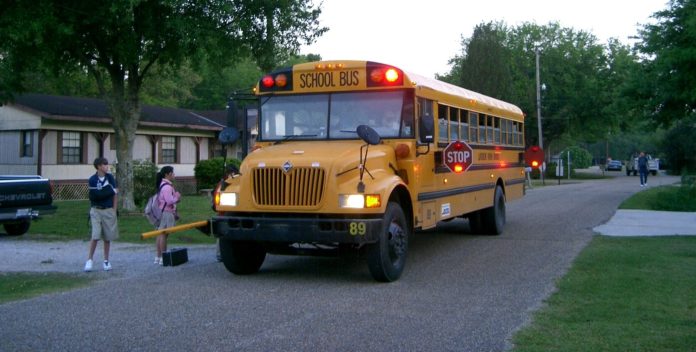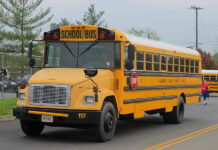The Kansas Senate on Thursday night agreed to expand a program that awards tax credits for donations to private school scholarships, reawakening a debate over how far the state should go to encourage a private education.
The Senate voted 23-14 to broaden the program that gives up to $10 million a year in state tax credits to entice businesses and individuals to donate money to a scholarship program for private schools.
The scholarships, limited to $8,000 a year for each student, are now available to students who are eligible for free lunches and enrolled in one of the state’s lowest 100 performing elementary schools for student achievement.
The legislation opens the door to more students by expanding the scholarship program to cover students who are eligible for free as well as reduced lunches and who are enrolled in any public school in Kansas.
Supporters see the program as a way to let parents have more control over where their kids go to school, especially those whose families’ incomes limit their ability to move to an area with better schools.
Critics say the tax credits subsidize private education with money that could be used to make public schools better.
They say private schools aren’t necessarily available to all students who might want to get a private education.
The bill, along with companion legislation in the House, has reignited a debate in the Capitol this year over how much the state should subsidize a private education with a program that advocates say is intended to promote school choice.
Opponents rallied against the legislation, saying it would divert money from public schools with tax credits that would help bankroll a private education with no accountability and the ability to turn students away.
“I unfortunately see this bill really as a school voucher loophole that is cloaked in a tax credit,” said Democratic state Sen. Tom Hawk of Manhattan.
Hawk drew the distinction between private and public schools, saying that private schools may help some children but not all children.
He acknowledged the bill was intended to help children, but said he thought it would allow private schools to “cherrypick” the best students and leave struggling students behind.
He said donors can still make contributions to private school scholarships, but just didn’t believe those should be subsidized with tax money.
Supporters of the legislation dismissed criticims of the program, saying the tax credits for the scholarship program weren’t much different from tax credits used for economic development.
“We’re saying anything that reduces any dollar in state revenue is somehow an attack on schools,” Senate President Ty Masterson said.
“The logic streams don’t end in an accurate spot. Otherwise, (increasing) the standard deduction we did the other day was an attack on schools, Masterson said.
“The bottom line: This does nothing to harm public schools,” Masterson said. “This spends zero taxpayer money. This helps hundreds of impoverished children.”
Other supporters said the bill is about helping children and their families.
“This is about students,” said Republican Sen. Renee Erickson of Wichita.
“I’ve heard the talk on the floor tonight mention schools and the state coffers and tax revenue,” Erickson said.
“It’s sad to me that we’re going to argue that the schools are hurt instead of arguing about what’s happening to these kids,” she said.
Going forward the question will be: Can the legislation be passed?
Gov. Laura Kelly hasn’t indicated whether she would veto the legislation, but she voted against creating the scholarship program as a senator back in 2014.
The Senate came up four votes short of overriding a potential veto with the Republicans losing Sens. John Doll, Jeff Longbine, Carolyn McGinn and Brenda Dietrich, who all voted against the bill. Another Republican – Sen. Rick Billinger – passed.
The Senate has less wiggle room to lose votes for a veto override since one Republican senator – Bud Estes of Dodge City – has missed the entire session because he’s been sick.
Estes’ absence leaves the Republicans with just 28 members, meaning they can only afford to lose one vote and still be able to override a veto.
Republican Sen. Molly Baumgardner, chair of the Senate Education Committee, said the complexion could change depending on what a House version of the bill eventually looks like. “It really depends on where we are as we move forward.”
Passage might be even harder in the House where 84 votes would be needed to override the governor’s veto.
Senate Minority Leader Dinah Sykes wouldn’t speculate about whether the governor would veto the bill and declined to say whether she’d ask the governor to veto the legislation.
“She knows my concerns with it,” she said. “Those have been made known.”
Sykes called the legislation “bad policy for our students and represents yet another attack on Kansas families by Senate Republican leadership and their special interest supporters.”
Currently, there are about 630 students who are receiving scholarships in the program, and lawmakers said they expect that to double if the program is expanded.
During the 2020-2021 school year, 632 students were awarded scholarships totaling approximately $2.0 million.
For tax year 2020, there were $3.5 million in contributions to scholarships, leading to $2.5 million in tax credits.
Since the program began in 2015, there have been $15.2 million in total scholarship contributions, with a total of $10.7 million in claimed tax credits.
















